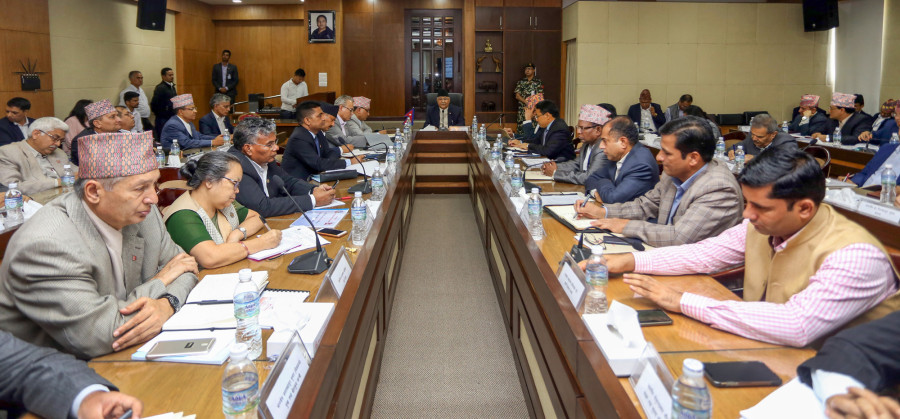National
Oli has signed work performance contracts with his ministers, but many doubt their efficiency
Stability in the bureaucracy and a lack of political interference, not performance contracts, key to finishing works on time, officials say.
Anil Giri
On August 1, Prime Minister KP Sharma Oli signed a work performance contract with Deputy Prime Minister and Minister for Defense Ishwor Pokhrel in order to implement projects on time and inject efficiency in service delivery. Oli has made similar contracts with most of his other ministers.
Nepal had instituted performance contracts in the mid-2000s, where projects chiefs and heads of corporations were required to sign a pledge stating that projects would be completed in time and services would be delivered without delay. Oli is the first prime minister to ask his ministers to sign such contracts in order to meet development and revenue targets, complete projects on time, ensure budget expenditure and move towards a clean, transparent and efficient service-oriented bureaucracy.
However, government officials and former bureaucrats told the Post that the work performance contract has not worked as envisioned. Numerous problems in government—a lack of budget, frequent transfers of secretaries, project chiefs and department heads, and a lack of human resources—are not reflected in the contract.
“Signing a performance contract between the prime minister and ministers is funny. I’ve never heard of it,” said Umesh Mainali, chairman of the Public Service Commission. “In a prime ministerial system, the prime minister is all. Ministers are accountable for their ministries while the Cabinet holds collective accountability. This is just publicity.”
A work performance contract between the prime minister and ministers goes down the chain of command whereas ministers sign such contracts with secretaries and secretaries with their division and department heads. The yearly work contract consists of completing projects and bringing about efficiency in overall governance according to annual policy and programme.
Since these are annual contracts, and there is a tendency to frequently transfer bureaucrats, Mainali questioned who would be responsible if a secretary was transferred prematurely.
According to the performance contract, if a secretary is transferred, their successor will carry on the tasks outlined by the contract.
“Then what is the meaning of singing a contract if secretaries are transferred frequently? What happens to resource mobilisation in such an unstable condition?” said Mainali.
Past experience does not bode well for the current contracts, said former finance secretary Shanta Raj Subedi.
“It was applied in the Ministry of Local Development and the Finance Ministry in the past,” said Subedi. “But indicators should not be based on daily work performance. Indicators should be clear on the objectives, what results are we going to achieve within a given time frame, and what mechanism and resources are in place to bring about changes and good results.”
Two government secretaries, both under condition of anonymity, told the Post that to ensure results, transparency, and timely completion of projects while achieving growth and meeting targets, the political leadership must ensure stability in the bureaucracy and prevent all political interference.
The adjustment of civil servants has yet to be completed and a sense of instability lingers in the civil service, according to the secretaries.
Binod Bahadur Kunwar, spokesperson at the Prime Minister’s Office, said that he had no records for the success and failure rates of each ministry.
“I am unable to question your answer because today is Friday,” said Kunwar. “It is almost 3pm and I am not obliged to answer your question.”
***
What do you think?
Dear reader, we’d like to hear from you. We regularly publish letters to the editor on contemporary issues or direct responses to something the Post has recently published. Please send your letters to [email protected] with "Letter to the Editor" in the subject line. Please include your name, location, and a contact address so one of our editors can reach out to you.




 18.12°C Kathmandu
18.12°C Kathmandu














